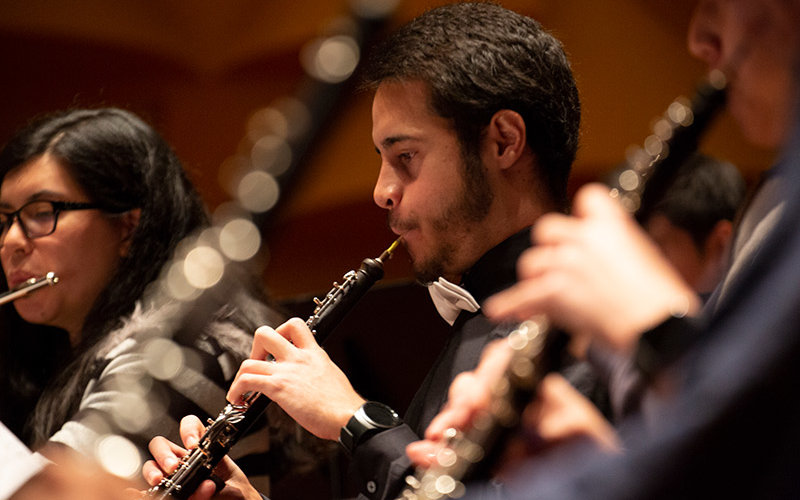
When Hurricane María hit Puerto Rico as a Category 4 storm in 2017, Jesús Ramos was in the process of applying to graduate school. He and millions of others spent weeks with no power, and Ramos missed all application deadlines.
When he was finally able to reach out to the universities to which he was applying, most were sympathetic but unable to help.
Enter Rong-Huey Liu, who leads the Cal State Fullerton School of Music’s oboe studio. She and Ramos had crossed paths years earlier, when Liu was principal oboe in an international chamber orchestra that mentored young musicians. She had encouraged him to apply to a summer program in Fresno where they played together for two years, and had asked what he was going to do about graduate school.
“It was Jesús’ determination, hard work and good attitude that were important in guiding him to pursue his dream,” said Liu.
Ramos received a scholarship to attend the School of Music and study with Liu, who has “revolutionized the oboe area,” in the School of Music, according to the school’s director, Katherine Powers. “She’s very passionate around teaching. She recruited Jesús — and he’s phenomenal.”
Ramos, who completed his bachelor’s in music at the Puerto Rico Conservatory of Music, is the recipient of the Jeffrey and Andrea Sward Scholarship for Double Reeds, endowed annually by Jeffrey Sward ’75, ’76, ’78 (B.M. music, B.A. mathematics, M.M. music-performance) and his wife, Andrea ’73, ’75, ’77 (B.A. psychology, M.S. library science, M.S. education-reading).
During 2018-19, students in the School of Music received more than $228,307 in scholarships. These include a portion of the annual ticket income from concerts.
“Music scholarships are the most important factor in recruiting good students,” said Liu. “I lose many potential oboe students to other schools that offer more scholarships, due to the fact that students consider how much debt they can avoid when they graduate.”
Upon arrival, Ramos dove seamlessly into ensemble life and is part of the University Wind Symphony, which just months ago performed at the College Band Directors National Association’s National Conference.
“Performance is 60 percent of the music curriculum. Every music major is in an ensemble every single semester until they graduate,” explained Powers. “They learn about playing their instrument, musicianship, musical expression, coordinating with others, intonation, rhythm … and you can’t learn that alone. You have to learn it in an ensemble.
“There are so many ensemble configurations, and all of our students will probably participate on several of them before they graduate, either as teachers or players or both. Having a variety of experiences is important.”
Ramos will soon begin his second year of graduate school in the School of Music, which he credits for encouraging a healthy competition, time management and other skills needed as a well-rounded professional. The oboe, he explained, has allowed him to reach places he never imagined. He would like to incorporate the oboe into a Latin music repertoire — “playing salsa, ballads, merengue, jazz, a little bit of everything, exploring more possibilities for the oboe while also serving as an educational platform for people … because most people know what a violin or a trumpet is, but don’t know the oboe.
“Sometimes I think I did not choose the oboe — it chose me,” he added. “Once that happened, doors began to open.”